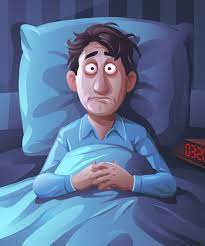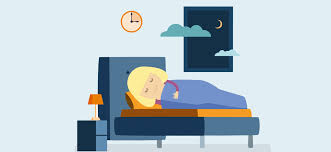In a world where productivity, never resting, and always doing something is idolized, our sleep is taking a beating. We are getting less and less of it, and when we do get some shut eye, it is not great quality.
This is a problem that is more common than we think, and it is called sleep deprivation. The fix? Sleep more. However, in our society this is simply unacceptable and, honestly, it is not that easy. So what are the basics? What is sleep deprivation and what are the effects it has on the body?
 Sleep deprivation is simply when a person does not get enough sleep. Usually if someone gets consistently less than seven hours of sleep a night, they are at high risk of sleep deprivation. Even though the cause seems simple the effects of sleep deprivation are far more complex.
Sleep deprivation is simply when a person does not get enough sleep. Usually if someone gets consistently less than seven hours of sleep a night, they are at high risk of sleep deprivation. Even though the cause seems simple the effects of sleep deprivation are far more complex.
According to Healthline, an online resource for health information, sleep deprivation has massive effects on every system in the body.
“Leptin tells your brain that you’ve had enough to eat. Without enough sleep, your brain reduces leptin and raises ghrelin, which is an appetite stimulant. The flux of these hormones could explain nighttime snacking or why someone may overeat later in the night,” Heathline said.
This can have an impact on the person’s everyday life because not getting enough sleep can lead to weight gain and inconsistent eating habits. This will also take a toll on the person’s mental health because they feel as though they are out of control and cannot regulate themselves and their habits.
Sleep deprivation, according to Healthline, also majorly affects the central nervous system.
“During sleep, pathways form between nerve cells (neurons) in your brain that help you remember new information you’ve learned. Sleep deprivation leaves your brain exhausted, so it can’t perform its duties as well,” the article said.
Doctor Diane Haddock, an internal medicine specialist at The University of Vermont Health Network, is very aware of sleep deprivation issues.
“Chronic sleep insufficiency can result in decreased alertness, decreased attention, and slower reaction times. This can then lead to motor vehicle accidents and errors,” said Dr. Haddock. “Poor mood and low energy are other consequences.”
Sleep allows your brain to make connections so that you can remember things, but lack of sleep can make this impossible. That can impact how well you do at school or even at your job, and then that added stress of not doing well can lead you to not sleep well at night.
It is easy to see how sleep deprivation has a snowball effect. It just keeps building and building off of itself. Everyday tasks, such as driving, can become immensely more risky and dangerous. So just how common is sleep deprivation?
More people have sleep deprivation than we think.
“According to the CDC, over a quarter of adults don’t get the recommended seven hours of sleep a night,” Dr. Haddock said.
This is a huge amount of people that are not being their best selves every day, and are possibly risking their lives and others when performing simple everyday tasks such as driving.
According to the CDC, “Nearly 40% of adults report falling asleep during the day without meaning to at least once a month.”
This is another incredibly high statistic that shows just how common and severe the effects of sleep deprivation actually are. So now that we know all of this, how do we fix it?
The fix is not as straightforward as you might think.
“The fix depends on the reason for sleep deprivation,” Dr. Haddock said. “Both quantity and quality of sleep are factors. Some reasons for sleep deprivation include work hours, family responsibilities, stress, and medical problems, like sleep apnea. Often it’s hard to fix the reasons for sleep deprivation, and then it becomes chronic.”
So we know telling someone to just sleep more is not actually that good of advice. What can we as a society do to help with sleep deprivation without saying to just sleep more?
“It’s important to identify the factors that cause someone’s sleep deprivation to help an individual try to improve their sleep,” Dr. Haddock said. “As a society, understanding demographic characteristics that put people at higher risk of sleep deprivation would be a start in looking for potential solutions.”































